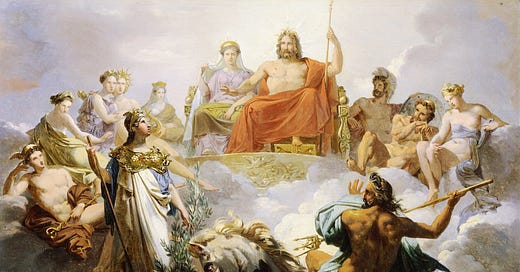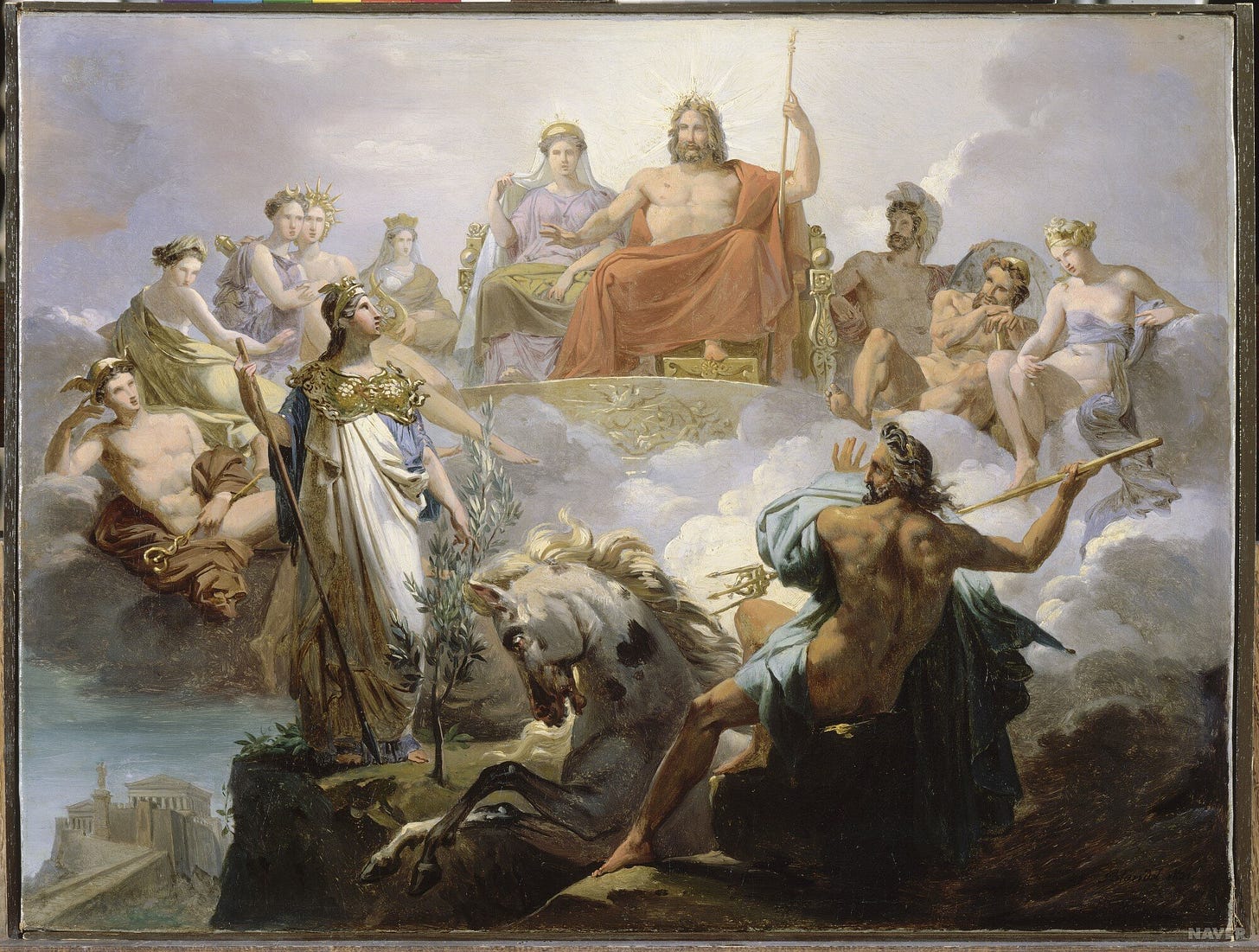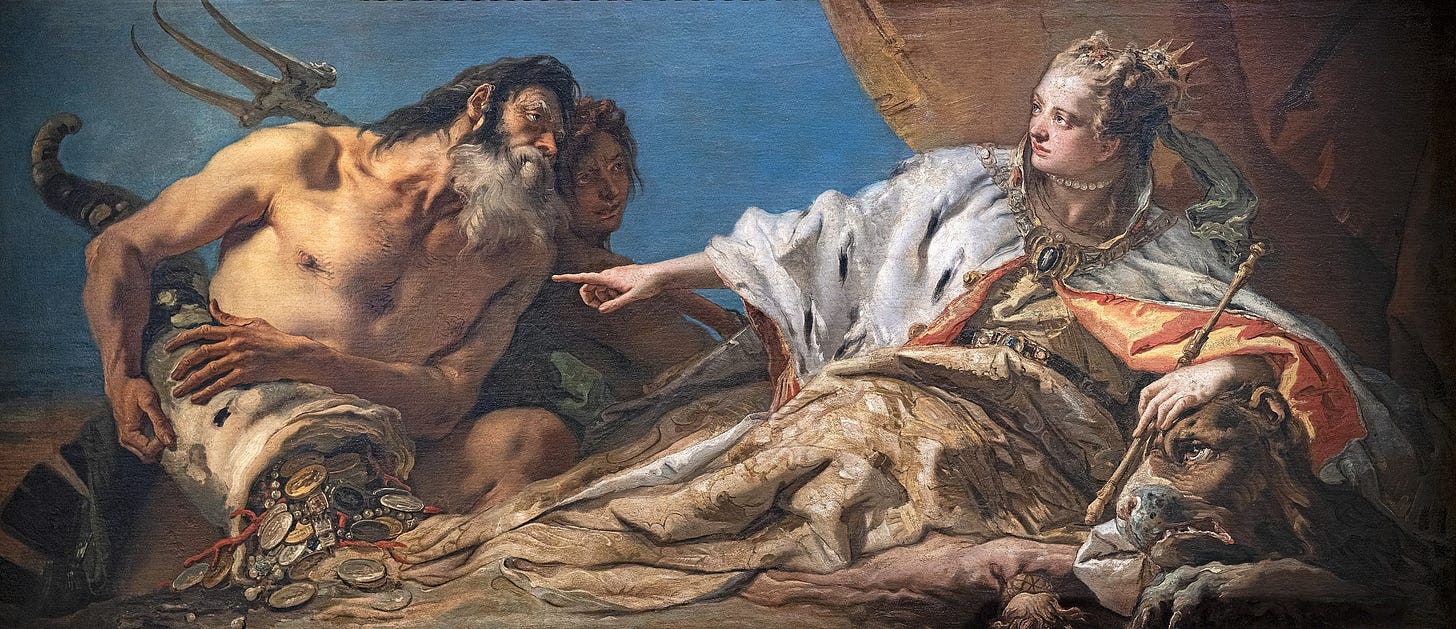“We think we can congratulate ourselves on having already reached such a pinnacle of clarity, imagining that we have left all these phantasmal gods far behind. But what we have left behind are only verbal spectres, not the psychic facts that were responsible for the birth of the gods. We are still as much possessed by autonomous psychic contents as if they were Olympians. Today they are called phobias, obsessions, and so forth; in a word, neurotic symptoms. The gods have become diseases; Zeus no longer rules Olympus but rather the solar plexus, and produces curious specimens for the doctor’s consulting room…”
- C.G. Jung, Alchemical Studies (CW 13)
Long gone are the days where we stand at the altar of the gods, appealing to their power and wisdom. Now we see the great forces of reality — like Time, Death, Love — as products under the control of human will.
We seek to master Time, bending it to our will through relentless scheduling, calendars and efficiency hacks. Death, once an inevitable fate met with awe, is now resisted at all costs with our desire for eternal youth and fear of the great beyond. Love’s most tender and explorative beginnings are increasingly relinquished to algorithmic moments of fate, making the process feel cold and unnatural.
In times past, from ancient civilizations spanning the world, we cultivated a relationship to these forces based on reverence; an acknowledgement that our influence and understanding can only go so far. In my eyes, this aids in establishing a healthy psychological ecosystem. Grappling with the transcendent in its many forms, feeling the pressure of our conscious boundaries, this reminds us of where we sit in the larger constellations of life.
Within this framing, the Gods are instinctual structures of the psyche, patterns of behavior, full to the brim with image, symbol, emotion and thoughts. When we fall out of step with them, we are subject to their retaliation. As Jung mentions in the quote above, we are still possessed by these autonomous energies, for they are a psychological truth. But rather than seeing them against a mythic backdrop that brings meaning, depth, and insight, we are left to pathologize or seek a remedy that comes from ego alone.
The Rage of the Warrior God is misinterpreted as anger issues we have to wrangle into submission. A tendency towards over abundance is not a Dionysian compensation but an unregulated emotional compulsion. We are lost to see the connection between a failure to launch, life as a puella, and the resistance of the Maiden Goddess to the uncertain journey of maturation.
A contemporary path of this form of inner work is not an invitation to return to the past, where perhaps we gave too much agency away to pantheonic deities or a central ruling figure in the sky. Rather, I see it as an act of synthesis, a bridge between disparate realms of psyche, a coming together of post-enlightenment clarity and ritualized spiritual worship. The Gods give us a container to meet our neglected or unknown parts of self and to see them as dignified, sacred, worthy of tender care and cultivation.
Reframing our struggles within the map of mythopoetics enlivens and stretches the boundaries of imaginal potential. Rich may be the solutions, paths towards healing and reconciliations that arise when we stop fighting against ourselves. When we admit, something more powerful is here, and dare to ask:
How can I best tend to your altar?
Discovering the Gods Within
“It is not a matter of indifference whether one calls something a “mania” or a “god.” To serve a mania is detestable and undignified, but to serve a god is full of meaning and promise because it is an act of submission to a higher, invisible, and spiritual being. The personification enables us to see the relative reality of the autonomous system, and not only makes its assimilation possible but also depotentiates the daemonic forces of life. When the god is not acknowledged, egomania develops, and out of this mania comes sickness.”
- C.G. Jung, Alchemical Studies (CW 13)
Central to this process is shaping our inner dynamics into mythic figures we can dialogue with. Personifying makes them psychologically real to the extent that we can understand their nature and all the idiosyncrasies that brings with it. Raising it to the level of a deity imbues this process with archetypal significance, thereby giving us access to deep layers of psyche and the ability to affect great change.
Does one go seeking for the temple of the gods or wait for them to crash into our life unexpectedly? I think both are possible, for example…
Some months ago I had a dream where I was told that I was subject to Neptune. That he caused a great deal of fogginess around me, my work, and other endeavors. I was prone to experience his wild surges, the sudden rising of flood waters and waves that threatened to engulf me.
I awoke from this dream with curiosity, struck by the clear message about the Roman god. Had I been impacted by Neptune all this time and simply not noticed? I began to contemplate the moments I felt pulled into the deep, when I immersed myself in formless, intangible waters. I considered the struggles I had been having to clear uncertainty, which paradoxically seemed to generate more fog that I felt lost within.
Was I out of balance with Neptune, forgetting to properly adhere to the devotions that would keep this archetypal energy grounded? Or, perhaps, was I overly identified with his otherworldly elements, requiring a complementary energy to establish a sense of equilibrium once more?
If a God or mythic figure hasn’t made itself clear through synchronous moments, obvious patterns or striking dreams, consider these three core steps.






